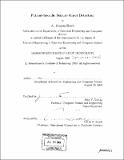Patient-specific seizure onset detection
Author(s)
Shoeb, Ali Hossam, 1981-
DownloadFull printable version (5.809Mb)
Other Contributors
Massachusetts Institute of Technology. Dept. of Electrical Engineering and Computer Science.
Advisor
John V. Guttag.
Terms of use
Metadata
Show full item recordAbstract
Approximately one percent of the world's population exhibits symptoms of epilepsy, a serious disorder of the central nervous system that predisposes those affected to experiencing recurrent seizures. The risk of injury associated with epileptic seizures might be mitigated by the use of a device that can reliably detect or predict the onset of seizure episodes and then warn caregivers of the event. In a hospital this device could also be used to initiate time-sensitive clinical procedures necessary for characterizing epileptic syndromes. This thesis discusses the design of a real-time, patient-specific method that can be used to detect the onset of epileptic seizures in non-invasive EEG, and then initiate time-sensitive clinical procedures like ictal SPECT. We adopt a patient-specific approach because of the clinically observed consistency of seizure and non-seizure EEG characteristics within patients, and their great heterogeneity across patients. We also treat patient-specific seizure onset detection as a binary classification problem. Our observation is a multi-channel EEG signal; its features include amplitude, fundamental frequency, morphology, and spatial localization on the scalp; and it is classified as an instance of non-seizure or seizure EEG based on the learned features of training examples from a single patient. We use a multi-level wavelet decomposition to extract features that capture the amplitude, fundamental frequency, and morphology of EEG waveforms. These features are then classified using a support vector machine or maximum-likelihood classifier trained on a patient's seizure and non-seizure EEG; non-seizure EEG includes normal and artifact contaminated EEG from various states of consciousness. (cont.) The outcome of the classification is examined in the context of automatically extracted spatial and temporal constraints before the onset of seizure activity is declared. During validation tests our method exhibited an average latency of 8.0[plus-minus]3.2 seconds while correctly identifying 131 of 139 seizure events from thirty-six, de-identified test subjects; and only 11 false-detections over 49 hours of randomly selected non-seizure EEG from these subjects. The validation tests also highlight the high learning rate of the detector; a property that allows it to exhibit excellent performance even when trained on as few as two seizure events from the test subject. We also demonstrate through a comparative study that our patient-specific detector outperforms a nonpatient-specific, or generic detector in terms of a lower average detection latency; a lower total number of false-detections; and a higher total number of true-detections. Our study also underscores the likely event of a generic detector performing very poorly when the seizure EEG of a subject in its training set matches the non-seizure EEG of the test subject.
Description
Thesis (M. Eng.)--Massachusetts Institute of Technology, Dept. of Electrical Engineering and Computer Science, 2003. Includes bibliographical references (p. 121-124).
Date issued
2003Department
Massachusetts Institute of Technology. Department of Electrical Engineering and Computer SciencePublisher
Massachusetts Institute of Technology
Keywords
Electrical Engineering and Computer Science.